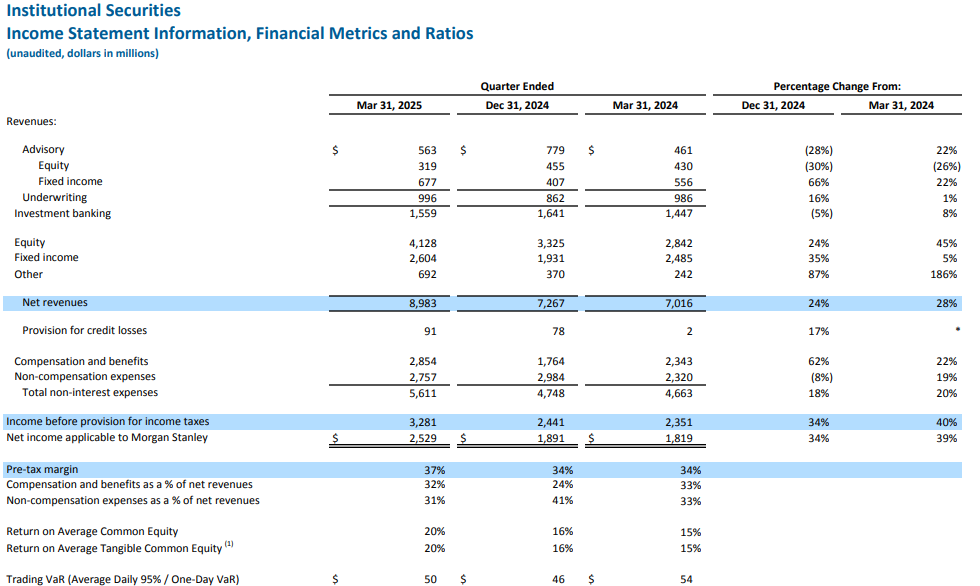Morgan Stanley Tops Q1 Estimates on Trading Strength, But Stock Slides on Mixed Reaction
Morgan Stanley delivered better-than-expected first-quarter results Friday, with strong equity trading and robust institutional performance helping the bank surpass muted expectations. Despite the beat, shares dipped from $109 to around $104 in early trading, suggesting investors are parsing the results cautiously amid broader market volatility driven by tariff uncertainty and recession fears. Still, the quarter was a clear operational success, anchored by record revenues and signs of resilience across core franchises.
Earnings Beat and Revenue Surprise
Morgan Stanley reported net income of $4.3 billion, or $2.60 per share, handily beating consensus estimates of $2.21 and up from $2.20 a year ago. Revenue reached a record $17.7 billion, exceeding expectations of $16.54 billion and rising 17% year over year. Return on tangible common equity hit 23%, and overall return on equity came in at 20% versus a 17.4% estimate. The bank’s efficiency ratio improved to 68%, helped by $144 million in severance charges linked to a March employee action.
Trading Division Carries the Quarter
The standout performer this quarter was the Institutional Securities division, which posted record net revenues of $9.0 billion. Equities trading was the primary driver, with revenue jumping 45% year over year to $4.13 billion, blowing past the $3.42 billion estimate. The firm cited strength across all equity business lines and highlighted Asia and prime brokerage as particular sources of growth amid heightened volatility and strong client flows.

Fixed income trading rose 5% to $2.6 billion, roughly in line with expectations, buoyed by solid results in foreign exchange and securitized products. Credit trading, however, was a drag, reflecting continued unevenness across product categories. Meanwhile, investment banking revenue climbed 8% to $1.56 billion, slightly below consensus but still encouraging given market headwinds. Advisory activity benefited from increased M&A completions, while fixed income underwriting rose amid a pickup in high-yield issuance. Equity underwriting declined due to subdued deal activity and client caution.
Wealth Management Growth Steady
Wealth management delivered revenue of $7.33 billion, up 6% from the prior year and largely in line with estimates. Pretax income came in at $2.0 billion, with a margin of 26.6%, slightly below the 28.2% forecast. Net new assets totaled $94 billion, reinforcing the bank’s long-term franchise strength despite macro turbulence. Net interest income rose modestly on higher lending volumes and investment yields, offset somewhat by a decline in sweep deposits. Management noted robust asset management fees and healthy client engagement.
Capital Markets Outlook and Investor Caution
While Morgan Stanley’s results were broadly positive, the stock’s retreat reflects lingering concerns around the capital markets backdrop. CFO Sharon Yeshaya acknowledged on the call that increased volatility has made company boards more cautious, weighing on advisory pipelines and delaying equity offerings. She emphasized, however, that there are no signs of dysfunction in the markets, a sentiment echoed by CEO Ted Pick, who pointed to a “very strong quarter” and consistent execution of the firm’s integrated growth strategy.
Even with record top-line results, the tone from management suggested a measured outlook for deal activity going forward. While volatility has driven trading revenues higher, it is also creating friction for corporate activity—especially in a tariff-sensitive environment where strategic decisions may be delayed.
Market Reaction and Strategic Implications
Despite the beat, Morgan StanleyMS-- shares declined post-earnings, reflecting either profit-taking or investor concern about the sustainability of trading gains and the impact of macro uncertainty on future capital raising. The stock has already dropped more than 15% this year, underperforming both the S&P 500 and peers like JPMorgan and Goldman Sachs. Still, the results should be reassuring to long-term investors. The firm is demonstrating broad-based revenue resilience, especially in its equity franchise and wealth business.
If equity markets stabilize and capital markets thaw later in the year, Morgan Stanley could be well-positioned to benefit from a reacceleration in M&A and underwriting activity. In the meantime, the firm’s diversified revenue mix and disciplined cost control should continue to serve as stabilizers in an otherwise choppy environment.
Senior Analyst and trader with 20+ years experience with in-depth market coverage, economic trends, industry research, stock analysis, and investment ideas.
Latest Articles
Stay ahead of the market.
Get curated U.S. market news, insights and key dates delivered to your inbox.

Comments
No comments yet